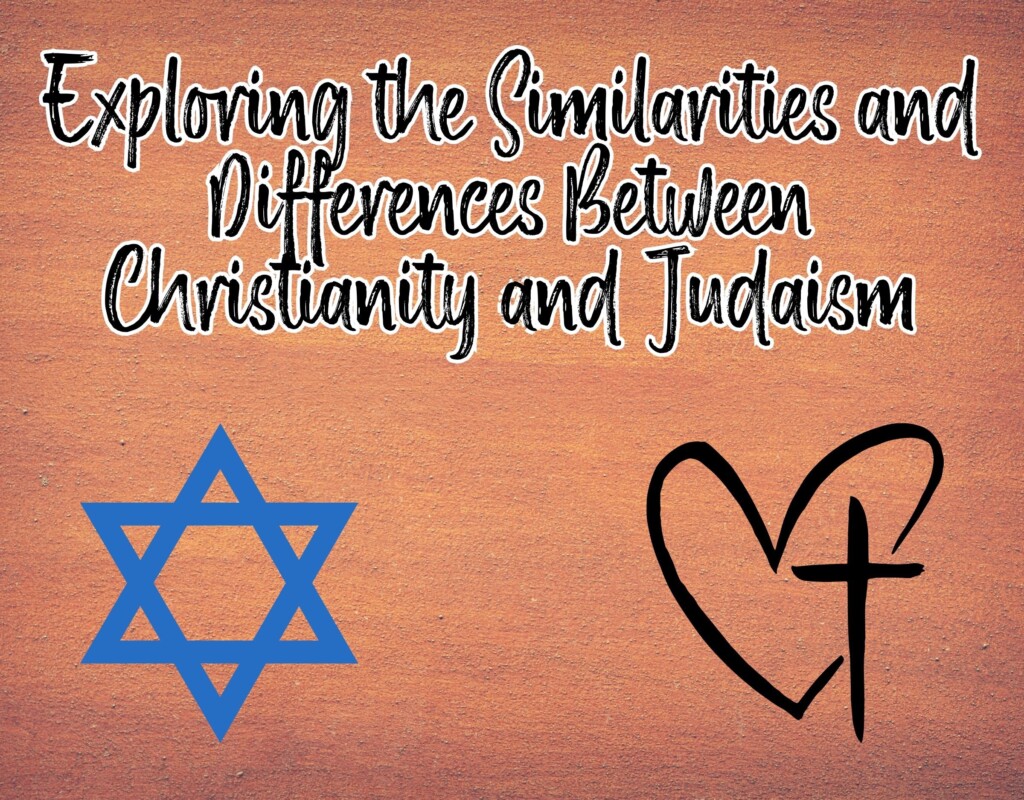Christianity and Judaism are two of the world’s oldest religions, both originating in the Middle East and sharing many common elements. However, they also have significant differences that set them apart. This article aims to explore the similarities and differences between these two faiths from a historical and theological perspective.

Historical Background
Judaism
Judaism is one of the oldest monotheistic religions, dating back over 3,500 years. It originated in the Middle East and is the faith of the Jewish people. The Hebrew Bible, or Tanakh, is the central religious text.
Christianity
Christianity emerged in the 1st century CE as a sect within Judaism. It was founded on the teachings of Jesus Christ, who Christians believe is the son of God. The New Testament of the Bible, which includes the teachings of Jesus, is a central text in Christianity.
Similarities
Monotheism
Both religions are monotheistic, meaning they believe in one God.
Sacred Texts
The Hebrew Bible forms the Old Testament in the Christian Bible, showing a shared history and set of sacred stories.
Moral Principles
Both religions have similar moral codes, including the Ten Commandments and teachings on charity, kindness, and the importance of community.
Rituals and Worship
Both religions have places of worship—synagogues for Jews and churches for Christians—and rituals, such as prayer and holiday celebrations.
Differences
Concept of God
In Judaism, God is a singular entity, not a trinity. Christianity, on the other hand, has the concept of the Holy Trinity: Father, Son, and Holy Spirit.
Messiah
Jews are still waiting for the coming of the Messiah, a future leader from the Davidic line, who will restore Israel and bring peace. Christians believe that Jesus was the Messiah.
Afterlife
Views on the afterlife differ between the two religions. While Christianity has a well-defined concept of heaven and hell, in Judaism, the idea of the afterlife, known as Olam Ha-Ba, is less emphasized and can vary.
Rituals and Practices
Christianity observes rituals like baptism and communion, which don’t have equivalents in Judaism. Jewish rituals not observed in Christianity include circumcision, kosher dietary laws, and observing the Sabbath from Friday evening to Saturday evening.
While Christianity and Judaism share a significant amount of history, beliefs, and moral teachings, they are distinct religions with their own sets of doctrines and practices. Understanding these similarities and differences can lead to a deeper understanding and respect for both faiths.
What is the significance of Jerusalem for both religions?
Jerusalem holds immense significance for both Christians and Jews. For Jews, it is the site of the First and Second Temples and is considered the eternal capital of the Jewish people. For Christians, Jerusalem is significant because it is where Jesus was crucified and resurrected.
Do Christians and Jews read the same Bible?
While Christians and Jews share the Old Testament, their Bibles are not identical. The Christian Bible includes the New Testament, which contains the teachings of Jesus Christ and the apostles. The Jewish Bible, known as the Tanakh, does not include the New Testament.
How do the religions differ in their worship services?
Jewish worship services are conducted in synagogues and are led by a rabbi. They involve reading from the Torah, singing, and prayer. Christian services are held in churches and are led by a priest, pastor, or minister. They often include sermons, hymns, and sacraments like communion.
What are the major holidays in each religion?
In Judaism, major holidays include Passover, Rosh Hashanah, Yom Kippur, and Hanukkah. For Christians, major holidays are Christmas, celebrating the birth of Jesus, and Easter, celebrating his resurrection.
How do the religions view each other?
Views can vary widely among individuals within each religion, but generally, there is a level of mutual respect rooted in their shared history and ethical teachings. Interfaith dialogue is common, and many religious leaders from both sides engage in discussions to promote understanding and tolerance.
Are there different denominations within each religion?
Yes, both religions have various denominations. In Christianity, there are numerous denominations, including Catholic, Protestant, and Orthodox. In Judaism, the main denominations are Orthodox, Conservative, and Reform.
Understanding the similarities and differences between Christianity and Judaism provides valuable insights into the beliefs, practices, and histories of these two ancient religions. While they share a significant religious and ethical foundation, their divergent beliefs make them distinct. By asking and answering these questions, we can foster a greater understanding and mutual respect between followers of these faiths.
As an Amazon Associate we earn from qualifying purchases through some links in our articles.



